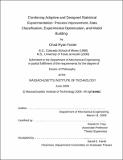Combining adaptive and designed statistical experimentation : process improvement, data classification, experimental optimization and model building
Author(s)
Foster, Chad Ryan
DownloadFull printable version (1.920Mb)
Other Contributors
Massachusetts Institute of Technology. Dept. of Mechanical Engineering.
Advisor
Daniel D. Frey.
Terms of use
Metadata
Show full item recordAbstract
Research interest in the use of adaptive experimentation has returned recently. This historic technique adapts and learns from each experimental run but requires quick runs and large effects. The basis of this renewed interest is to improve experimental response and it is supported by fast, deterministic computer experiments and better post-experiment data analysis. The unifying concept of this thesis is to present and evaluate new ways of using adaptive experimentation combined with the traditional statistical experiment. The first application uses an adaptive experiment as a preliminary step to a more traditional experimental design. This provides experimental redundancy as well as greater model robustness. The number of extra runs is minimal because some are common and yet both methods provide estimates of the best setting. The second use of adaptive experimentation is in evolutionary operation. During regular system operation small, nearly unnoticeable, variable changes can be used to improve production dynamically. If these small changes follow an adaptive procedure there is high likelihood of improvement and integrating into the larger process development. Outside of the experimentation framework the adaptive procedure is shown to combine with other procedures and yield benefit. Two examples used here are an unconstrained numerical optimization procedure as well as classification parameter selection. The final area of new application is to create models that are a combination of an adaptive experiment with a traditional statistical experiment. (cont.) Two distinct areas are examined, first, the use of the adaptive experiment to determine the covariance structure, and second, the direct incorporation of both data sets in an augmented model. Both of these applications are Bayesian with a heavy reliance on numerical computation and simulation to determine the combined model. The two experiments investigated could be performed on the same physical or analytical model but are also extended to situations with different fidelity models. The potential for including non-analytical, even human, models is also discussed. The evaluative portion of this thesis begins with an analytic foundation that outlines the usefulness as well as the limitations of the procedure. This is followed by a demonstration using a simulated model and finally specific examples are drawn from the literature and reworked using the method. The utility of the final result is to provide a foundation to integrate adaptive experimentation with traditional designed experiments. Giving industrial practitioners a solid background and demonstrated foundation should help to codify this integration. The final procedures represent a minimal departure from current practice but represent significant modeling and analysis improvement.
Description
Thesis (Sc. D.)--Massachusetts Institute of Technology, Dept. of Mechanical Engineering, 2009. This electronic version was submitted by the student author. The certified thesis is available in the Institute Archives and Special Collections. Includes bibliographical references.
Date issued
2009Department
Massachusetts Institute of Technology. Department of Mechanical EngineeringPublisher
Massachusetts Institute of Technology
Keywords
Mechanical Engineering.